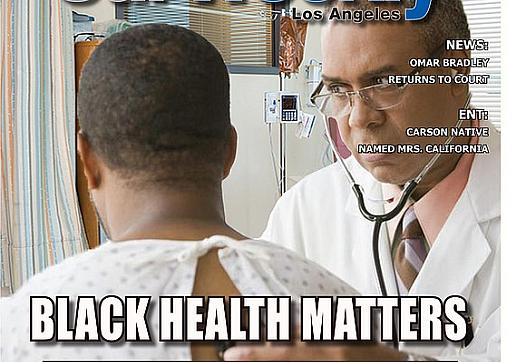‘Take charge of your life’ is advice from stroke patient
This story was originally published in OurWeekly with support from the 2022 California Fellowship.

Having a stroke can be one of the most life-altering conditions a person could experience. There are many pre-stroke indicators that lead to what neurologists typically call a “brain accident,” but some things can be addressed early to prevent physical and mental incapacity from occurring.
Dr. Juan Cabrales, supervisor of the Acute Care Clinic at Martin Luther King Community Hospital in Watts, wants more of his patients to take a proactive stance against stroke long before these persons are rushed to the emergency room. It begins with good health maintenance including doctor visits for check-ups, a balanced diet, regular exercise and how to manage “everyday stress” which can not only prevent stroke but increase a person’s quality of life.
“When I see a patient and make a diagnosis, they don’t leave until I explain to them ‘this is what we have to do’ in order for them to get better,” said Cabrales who sees patients once they’ve been discharged from the hospital. His patients suffer from a variety of preventable illnesses, therefore Cabrales will set into motion the hospital’s recommendations for a particular case, while making sure that the individual strictly adheres to any and all health protocols as well as following prescription directions.
“Heart failure, diabetes, high cholesterol...these are the issues we see most,” he continued. “Once a patient is discharged from the hospital, the care does not stop there. We must see these individuals and develop a one-on-one relationship that is so important in recovery. For instance, with diabetes, I’ll explain why people develop it, how you can manage it, and what you can expect if you either follow—or in some cases—do not follow a dietary regimen designed to promote good health. We want to get at these diseases before an emergency room visit, because by that time many patients have been suffering in silence, often not knowing what is making them sick. We need to see patients before they become so ill that their lives have been interrupted due to unchecked illness.”
Cabrales said that the Latino community in South Los Angeles is experiencing an increase in cases of high cholesterol, diabetes and obesity namely because of too much fast food and a lack of fresh food options. “The traditional Latino diet has traditionally been a high-fat cuisine, and couple that with the busy lifestyle of parents having to work then come home and prepare dinner, too often the children will eat a lot of fast food and not get enough exercise which can result in obesity as they get older. What we want to do is ‘prevent’ the fire instead of constantly ‘putting out’ the fire in terms of health management. We’re getting the word across because we’re out in the community encouraging a balanced diet and regular exercise.”
Caroline McIntosh is one of Cabrales’ patients. A 49-year-old mother of two and grandmother of three, McIntosh had a stroke earlier this year—on Super Bowl Sunday to be exact—and explained that years of high-fat food, high stress and not exercising regularly likely contributed to her condition. She never had a primary doctor until visiting MLK Hospital and it was only then that her weight problem (in excess of 350 pounds) may have contributed to her diabetes diagnosis, a mild heart attack she suffered last fall, and the stroke in February. McIntosh is much better now and said she owes her life to the physicians at MLK who were there with “straight talk” about changing her lifestyle habits.
“I never smoked...never drank, but I did have a sciatica (nerve damage in the spine) and they explained that being overweight and a lack of exercise may have been the reasons behind my stroke,” McInsosh said. “I never ate a lot of junk food, but I had trouble keeping the weight off. Some of my relatives have diabetes, so that’s why I’m working each and every day to monitor my diet, get good exercise and control my diabetes.”
The stroke has left her with slight numbness in her right fingertips, but her condition has not worsened. And she’s down to 295 pounds and working daily to shed even more weight.
“They saved my life,” McIntosh noted. “They put me in touch with experts who are concerned with my well being and I am very satisfied with the way they’ve showed me how to take charge of my health...to learn how to better appreciate myself. I do my physical therapy everyday, and I’m motivated to do more. I want to be around to see my grandchildren grow. We have help [in Watts] so my best advice is to take full advantage of it. Your life may depend on it.”


